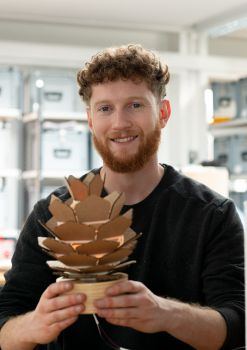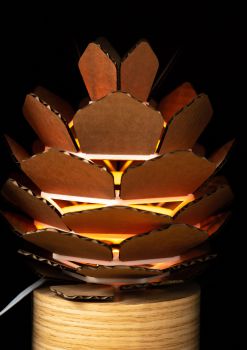Engineering and Design news
Waking up earlier for a better night’s sleep
By: Neil Vowles
Last updated: Thursday, 4 July 2019

Jimmy McNamara with his Sound Sleep invention.

A University of Sussex student believes he has developed a new product guaranteed to give its user a great night’s sleep – even if it does wake them up earlier than they plan to.
Sound Sleep has been created by product design student Jimmy McNamara to help gently lull its users to sleep and to wake them up at the optimum moment in their sleep cycle.
Unlike conventional alarms that jolt a sleeper awake with a piercing noise regardless of where they are in the sleep cycle, Sound Sleep uses motion tracking technology to wake the user during their lightest stages of sleep.
Jimmy, 22 and from Oxted, in Surrey, said: “Waking up from different stages of sleep can have a huge bearing on how refreshed someone might feel after a night’s sleep.
“Being awoken much more gradually can help you feel more awake. If you tell Sound Sleep I need to be awake at 6.30am at the latest, it might wake you up earlier than that but in a part of your sleep cycle that will mean you will feel more alert and awake than if you had been abruptly shaken from whatever stage of sleep you had entered into at 6.30am.
“So even if you’re awake 30 minutes earlier than you might have planned to, you will feel much more awake and ready to face the day than if you’d had those extra minutes in bed before being dragged from deep sleep by an alarm set to the ticking clock on the wall rather than your own body clock."
NHS figures show that one in three people in the UK are severely sleep deprived which can lead to a host of potentially deadly ailments including diabetes, cardiovascular disease, musculoskeletal disorders, kidney disease, mental health problems, neurological disorders, respiratory problems, and thyroid disease.
While a small number of the population may suffer from medical ailments that impacts their sleep, the majority of the UK’s "barely functioning sleep-deprived" are suffering unnecessarily because of very poor night-time practices and habits which Sound Sleep can help to correct.
The app-controlled product uses the brain’s response differs to different wavelengths of light to help lull its users to sleep.
The blue light from a mobile phone delays the build-up of melatonin in the body and can push back the natural sleep time. By contrast, orange light given off by Sound Sleep can be used to increase levels of melatonin and eventually bring on sleep.
Calming music and meditation tapes can also be played as part of the app to help aid a gentle drifting off to sleep.
The lights dim gradually over time, gently preparing the body for a night of restful sleep
In the morning, Sound Sleep exposes users to a bright white light which can reduce sleep inertia leaving its user feeling more refreshed and alert.
Jimmy said: “Some people might be able to shake off sleep inertia relatively quickly but for others it can stay with them for much longer. If you wake up correctly from the right section of your sleep, it can really set you for the rest of the day.
“Sound Sleep will help people to gently fall asleep and wake up refreshed. It’s rare to find an all-encompassing solution like this currently available on the market. A lot of products only monitor the quality of sleep but don’t do anything to rectify the problem. Those products that do assist with getting people to sleep rarely assist with helping you to wake in the morning which is just as important.”